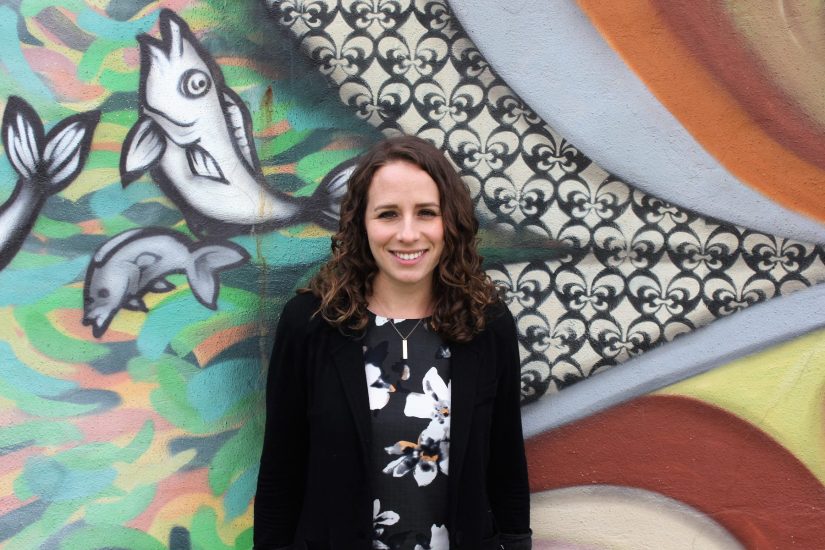As much as she loves research, Marjorie Wonham, the newest faculty member in the UW Marine Biology program at UW, is passionate about teaching.
A weekly SAFS Cafe, every Wednesday
Join us every Wednesday at 3.30pm for coffee, treats and community conversation this Winter 2024 Quarter!
Take a break from your busy week and join your fellow SAFS community – students, staff, researchers, faculty – every week.

Bringing the Seafood Globalization Lab to SAFS: welcome to Jessica Gephart
Joining SAFS as Assistant Professor in January 2024, Jessica Gephart brings to the school her expertise in global food trade systems. Always having an interest in scientific problems, Jessica started off her career in aquatic ecology and modeling before becoming involved in a side project in her lab at the time, focused on food systems and food trade. “I was interested in the modeling approaches that parallel these systems and realized that a lot of studies didn’t look at fish at all. Most food system studies looked exclusively at crops and livestock,” Jessica shared.

She began to think about how answers changed if fish were brought into the picture, and how this would impact questions around sustainability in these systems: “I discovered that there was a much bigger question here, and it needed more attention.”
With her background in ecosystem ecology, Jessica made the decision to move more in the direction of food systems, and specifically aquatic food systems, and began a deep dive into the trade side of fisheries using network-based approaches. “One thing I find surprising is when it comes to the big questions about characterizing our food systems, a lot of basic information is unknown,” she said. “When I first started working in this space, questions about linking consumption to environmental impacts led me to questions about distinguishing between wild caught and farmed fish. But the way that data is collected about aquatic food systems, these questions aren’t answered, and we didn’t know the most basic things like the quantity of trade of wild versus farmed.”
Seafood is a critical global food resource, providing nearly 20% of global animal protein and supplying essential fatty acids and micronutrients, and is one of the most highly-traded foods across the globe. Setting up her Seafood Globalization Lab at SAFS, where she will be recruiting students to work on research projects with her, Jessica shared that one of the reasons she loves working on food is because of how interdisciplinary it is. “You have to recognize that you don’t have all of the answers in this field. And this opens up so many opportunities to learn from other people and disciplines about their approach to solving parallel or related questions,” she said.
She’s excited to build up her lab and build up her own connections in her new role at the University of Washington: “Building the right team of people who have the pieces of the puzzle to put it together – I love that. In food systems, you pull on one thread and it winds up being a huge, complicated problem, and that’s exciting.” Jessica’s lab brings together people to work on research involving global trade data, local consumption data, and environmental impact data to understand the opportunities and risks of seafood globalization for sustainable production and food security.

When working on global aquatic food trade system research, it uncovers some surprising issues: “There isn’t routine collection of consumption data. A lot is estimated based on how much is produced and then comparing with import and export data. This means there is so much uncertainty in understanding consumption patterns at a national and global level,” Jessica shared.
Being part of a school with a strong legacy and reputation in fisheries management is something Jessica is particularly looking forward to. “I’m excited to join fishery scientists and other ecosystem scientists and open up more dialogue across methods. And I’m excited to connect my work related to trade with the world of fisheries management,” she said. The location of SAFS within the College of the Environment is also another bonus for her: “I’ve already been making some great connections with other programs and folks working on policy and environmental forensics where they’re working on related issues such as the connection between forestry and the illegal fish trade.”
Global food trade is a hot topic worldwide right now. Jessica explains why: “Part of it is because there is a rapid recognition of the need to understand aquatic organisms as food and look at fisheries and aquaculture resources not just from a natural resource viewpoint, but also the role they play in communities, livelihoods and diets.” Working across both marine and inland fisheries, capture and aquaculture, Jessica’s work spans these spaces to answer questions around where, what, and how much, is traded in order to identify opportunities for aquatic foods to contribute to more sustainable food systems.